
26th July 2024 admin Category :
“The first thing they ask you is if you have an AK-47 – and if you can swim,” says Abdirizak Ahmed.
That, he says, is what pirate networks want of their new recruits.
Mr Ahmed is head of counter-piracy for the s
emi-autonomous northern state of Puntland, which has 1,400km (870 miles) of Somalia’s coastline – and is home to most of its pirates.
Maritime piracy cost the world economy more than $700m (£528m) last year, according to Oceans Beyond Piracy, a non-profit organisation attempting to develop a globally co-ordinated response to the problem.
It has now spread far beyond Somalia to West Africa, with the Gulf of Guinea now regarded by many as having the most dangerous waters in the world.
What’s more, piracy has gone hi-tech.
Cyber-pirates
When pirates raid ships, they generally have a good idea what they’re after, because shipping databases are often surprisingly insecure.
Professional hackers break in online, steal ships’ manifestos and sell them on the dark web.
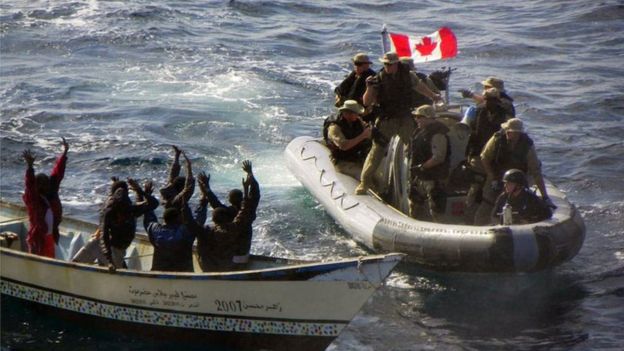 Image copyrightNATO
Image copyrightNATOThis is why the pirates know exactly where to look, “down to the bar code and serial number of the shipping container, in some cases,” says Bryan Sartin, managing director of US company Verizon Risk, which investigates data breaches and cyber-attacks.
Servers aboard ships might not be regularly patched or updated, because of long stints on the water. This makes them easier hacking targets when they eventually do connect to the internet.
“An insecure inventory and loading-bills database is akin to drawing these pirates a treasure map,” says Sian John, chief strategist for the area with Symantec, a cybersecurity firm.
Freely available vulnerability scanners would identify most shipping companies’ security flaws, Mr Sartin says. And simple security tools, like two-factor authentication – whereby log-in details are supplemented by a security code generated by a separate device – would also help.
Drone raiders
Pirates have begun flying drones which they use to scout busy sea lanes for unguarded ships, lacking security crews or razor-wire.
Previously, they would rely on watchmen in ports and others posing as innocent fishermen, says Philippe Minchin, of BCB International, a firm specialising in life-saving and security equipment.
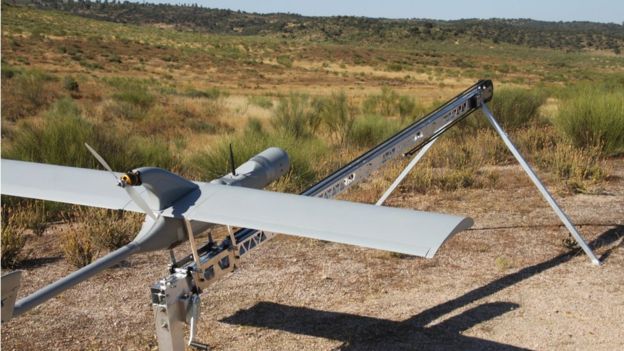 Image copyrightBSI
Image copyrightBSITo address these challenges, African governments and shipping companies have been fighting fire with fire. That fight is not just on the seas. It’s now in the skies and over the internet.
Drones equipped with face-recognition technology are being used to look for known pirates and to act as surveillance scouts in high-threat areas such as the Bab al-Mandab strait between Yemen, Djibouti and Eritrea, says Vice Admiral Peter Hudson, who commanded EU maritime operations off Somalia between 2009 and 2011.
These companies are also developing “killer drones” that aim to scramble the GPS signals of the pirates’ drones and activate their return-to-home functionality.
Shipping firms in Africa are keen to reduce their dependence on heavily armed security teams, because they “cost a fortune and leave flag states uncomfortable with the fact that armed men wander around complex merchant ships,” says Vice Adm Hudson.
Web of intrigue
So other technologies are also being deployed.
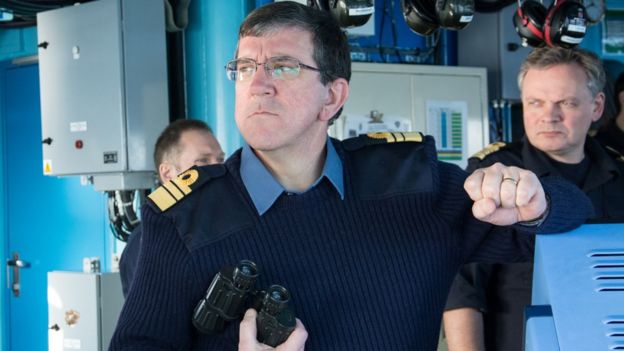 Image copyrightNATO
Image copyrightNATORecent developments have included laser dazzlers, directional sonic devices that cause pain to pirates, and spider-web nets that can entangle attacking vessels, says Vice Adm Hudson.
One entangling net device is the Barracuda, made by BCB International. It snags itself around an attacking small vessel and wraps it in webbing, thereby disabling it.
It can be fired by handheld compressed-air cannons, or by cannons controlled remotely from a ship’s bridge or an off-vessel control room, says Mr Minchin.
Most new equipment, like the Barracuda, has been non-lethal to reduce escalation of conflict – and the chance of innocent fishermen being killed.
In February 2012, two Indian fishermen were mistaken for pirates in a well-publicised incident. They were shot dead by Italian marines guarding an oil tanker called the MV Enrica Lexie.
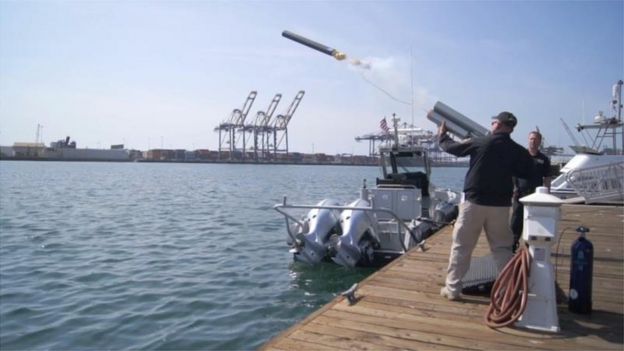 Image copyrightBSI
Image copyrightBSIBut simply communicating online has also helped, with Africa’s shipping businesses sharing information about pirate groups’ activities, says Ibrahim Ahmed Abdinoor, chief executive of the African Shipping Line.
And religious leaders taking to social media to criticise piracy has had a strong impact in Puntland, says Abdirizak Ahmed.
Vice Adm Hudson calls this approach “catch-a-pirate dotcom”.
Unfinished business
But the fight against piracy is a continuous struggle.
With oil prices sinking, pirates have shifted from stealing tankers’ contents, to abducting their crew. In the first half of this year, 44 crew were taken for ransom – 22 in Nigeria alone, says the International Maritime Bureau. This compares with 10 worldwide in the first half of 2015.
And 70% of piracy incidents go unreported, says Jon Huggins, a former US Navy officer and Oceans Beyond Piracy’s director.
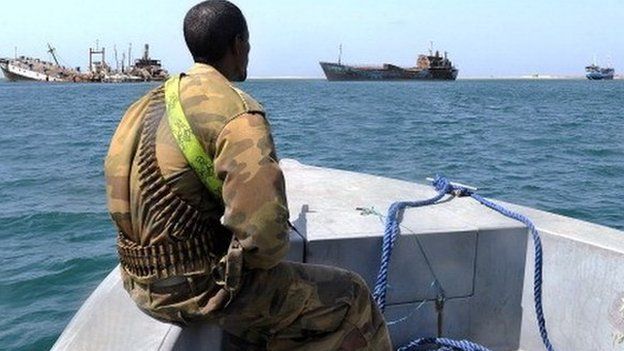 Image copyrightAFP
Image copyrightAFPNo-one has yet been jailed or prosecuted for piracy in West Africa, says Mr Huggins, though Nigeria has increased patrols.
The efforts by Abdirizak Ahmed in Puntland, and by international naval operations, have managed to reduce piracy incidents off the coast of Somalia by 90% since 2013.
Despite this, Mr Ahmed, who has been doing the job since 2010, says he feels “exhausted, and very frustrated”, because the repercussions of the Somali piracy crisis are still being felt.
Kismayo, a port in southern Somalia, can still only export goats and sheep to the Gulf in small boats. Larger ships remain unwilling to dock there, despite the port being safe, according to African Shipping Line’s Mr Abdinoor.
This means farmers inland from Kismayo can sell fewer animals to a hungry Gulf market. Although the port has a capacity to ship more than two million head of livestock annually, it presently ships less than one million.
Livestock contributes 40% to Somalia’s economy, according to the UN Food and Agriculture Organization. But with increased maritime access to Gulf countries, this figure could rise to about 60%.
So it’s not just the profits of shipping firms and merchants that are hit by piracy. Economies, too, are affected. The stakes are high in the hi-tech battle to tackle the pirates.







